Wilderness Paradox
One concept that I see being repeated over and over again is
that if there is a large bi-pedal ape in North America it must
live in only the most remote, secluded wilderness areas.
Commonly areas pointed to as likely habitat are the Pacific
Northwest, British Columbia, Northern California or if "back
East", only inaccessible mountainous terrain.
But do witness reports really bear out this assumption?
Let's take a look at several reports that have been posted by
the BFRO, The Bigfoot Field Researchers Organization.
Omaha, Nebraska
Various sightings near the Missouri River in Omaha, Nebraska.
I interviewed this witness. Although the report only goes into
recent activity she told me that her family has had several
sightings and heard vocalizations going back as far as the early
1960's. What is significant is that this area is bounded on all
four sides by major thoroughfares: I-480 on the west and
north, I-29 on the east, I-80 on the south. It is also within
1 1/2 miles of the central district of Omaha, Nebraska.
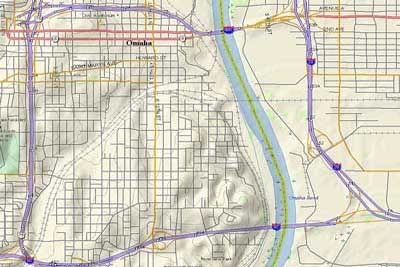
Of special note is that Marlin Perkins who hosted Mutual of
Omaha's Wild Kingdom made a trip to the Himalayas with
Sir Edmund Hillary in 1960 to check out reports of the Yeti.
While on that trip they examined a supposed Yeti scalp that
turned out to be a hoax. Perhaps they should have saved
their money, stayed home and talked to local witnesses in
Omaha.
Topeka, Kansas
Hiker finds footprint near Topeka, Kansas.
What is significant about this report is the excellent picture that
he was able to obtain of a possible juvenile bigfoot print. The
exact location although not stated is within a couple miles of
downtown Topeka and along the Kansas River.
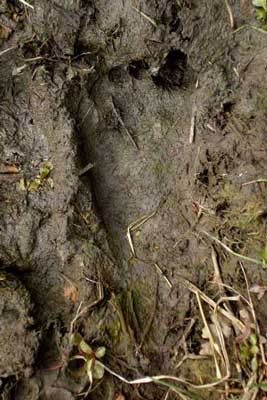
St.Louis County, Missouri
Bow hunter observes animal in Creve Coeur bottoms.
This report comes from an area that is 15 miles from downtown,
St.Louis, Missouri and along the Missouri River. It also is only a
couple of miles from very populated suburbs in west St.Louis
County. This area is bounded on the west and south by I-40,
on the north by I-70 and east by I-270.
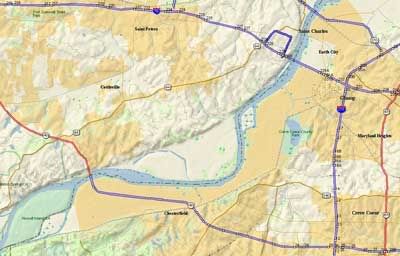
Madison County, Illinois (unpublished)
This rural location in Madison County, Illinois has been the site
of ongoing bigfoot sightings. It is near a small creek and
approximately 15 miles from the Mississippi River. I did an on
onsite investigation and saw several sets of footprints.
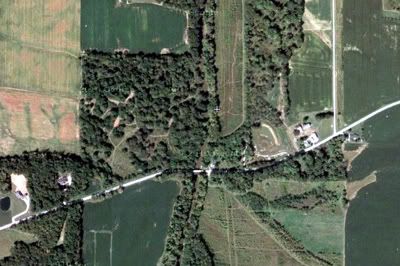
Central Illinois. (unpublished)
Another rural location in Central Illinois. This site is also located
on a small wooded creek that flows through corn and soybean
fields. It is located 13 miles from the Sangamon River.
Numerous whistles, woodknocks and howls have been
recorded at this site.
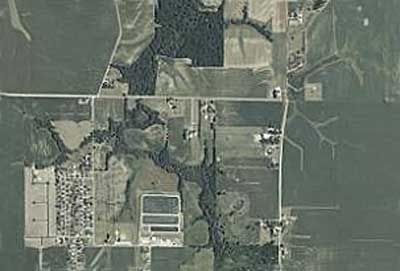
Lee County, Illinois
Hikers find footprint along Franklin Creek.
This footprint was found along a small wooded creek in an
agricultural area of Northern Illinois. It is located 5 miles
from the Rock River.
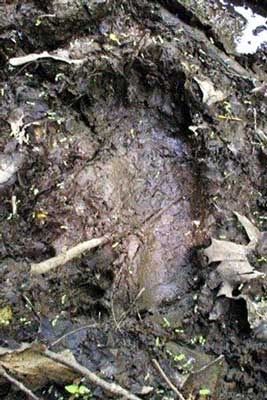
Food - Water - Cover
The important factors for possible bigfoot habitat seem to be
wooded streams or river systems and an adequate food
supply, particularly a large deer population. Reports
continue to come in whether they are close to major urban
centers or agricultural areas.
It has been stated that the Pacific Northwest has a resident
population of bigfoot on every watershed. A growing number
of researchers are gradually coming to realize that perhaps
it is the same situation east of the Rockies.
that if there is a large bi-pedal ape in North America it must
live in only the most remote, secluded wilderness areas.
Commonly areas pointed to as likely habitat are the Pacific
Northwest, British Columbia, Northern California or if "back
East", only inaccessible mountainous terrain.
But do witness reports really bear out this assumption?
Let's take a look at several reports that have been posted by
the BFRO, The Bigfoot Field Researchers Organization.
Omaha, Nebraska
Various sightings near the Missouri River in Omaha, Nebraska.
I interviewed this witness. Although the report only goes into
recent activity she told me that her family has had several
sightings and heard vocalizations going back as far as the early
1960's. What is significant is that this area is bounded on all
four sides by major thoroughfares: I-480 on the west and
north, I-29 on the east, I-80 on the south. It is also within
1 1/2 miles of the central district of Omaha, Nebraska.

Of special note is that Marlin Perkins who hosted Mutual of
Omaha's Wild Kingdom made a trip to the Himalayas with
Sir Edmund Hillary in 1960 to check out reports of the Yeti.
While on that trip they examined a supposed Yeti scalp that
turned out to be a hoax. Perhaps they should have saved
their money, stayed home and talked to local witnesses in
Omaha.
Topeka, Kansas
Hiker finds footprint near Topeka, Kansas.
What is significant about this report is the excellent picture that
he was able to obtain of a possible juvenile bigfoot print. The
exact location although not stated is within a couple miles of
downtown Topeka and along the Kansas River.

St.Louis County, Missouri
Bow hunter observes animal in Creve Coeur bottoms.
This report comes from an area that is 15 miles from downtown,
St.Louis, Missouri and along the Missouri River. It also is only a
couple of miles from very populated suburbs in west St.Louis
County. This area is bounded on the west and south by I-40,
on the north by I-70 and east by I-270.

Madison County, Illinois (unpublished)
This rural location in Madison County, Illinois has been the site
of ongoing bigfoot sightings. It is near a small creek and
approximately 15 miles from the Mississippi River. I did an on
onsite investigation and saw several sets of footprints.

Central Illinois. (unpublished)
Another rural location in Central Illinois. This site is also located
on a small wooded creek that flows through corn and soybean
fields. It is located 13 miles from the Sangamon River.
Numerous whistles, woodknocks and howls have been
recorded at this site.

Lee County, Illinois
Hikers find footprint along Franklin Creek.
This footprint was found along a small wooded creek in an
agricultural area of Northern Illinois. It is located 5 miles
from the Rock River.

Food - Water - Cover
The important factors for possible bigfoot habitat seem to be
wooded streams or river systems and an adequate food
supply, particularly a large deer population. Reports
continue to come in whether they are close to major urban
centers or agricultural areas.
It has been stated that the Pacific Northwest has a resident
population of bigfoot on every watershed. A growing number
of researchers are gradually coming to realize that perhaps
it is the same situation east of the Rockies.


<< Home